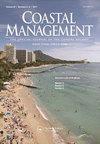The State of Beach Litter Pollution during the COVID-19 Pandemic: A Case Study of the Israeli Coasts
IF 1.9
4区 环境科学与生态学
Q4 ENVIRONMENTAL SCIENCES
引用次数: 5
Abstract
Abstract This research examines the impact of the COVID-19 pandemic on marine litter pollution along the Israeli coast, which constitutes a terminal area in the Mediterranean Sea large-scale circulation. Surveys for litter were conducted on four beaches along the Israeli Mediterranean coast. Sampling was done pre-pandemic in June, September, and December of 2019; during the first year of the pandemic in March, June, September, and December of 2020; and during the second year of the pandemic in March 2021. The study revealed that during the first year of the pandemic, beach litter concentration was reduced by 47 ± 27% on all beaches. The decrease in beach litter continued during the second year on most beaches (34 ± 22% reduction) and was most observable for plastic products, which have a high potential to float and travel long distances. The decline in beach litter concentration in the Israeli beaches during the pandemic was statistically significant. The barcode analysis indicates the appearance of non-Israeli debris on the shores (22-81% pre-COVID-19 and 5-47% during-COVID-19), which supports the assumption that the reduction in marine litter pollution was affected by the decline in beach activity both locally and in other coastal neighboring countries. An additional effect of the pandemic was the appearance of single-use plastic masks and gloves in April 2020, influenced by the epidemic’s regulations and restrictions. Despite the decline in beach marine litter concentration during COVID-19, plastic pollution is a high concern in this heavily populated coastal region. Our data set provides an indication for the potential of local and regional regulations to reduce further beach litter pollution and a baseline for continuous monitoring of these processes. Highlights The impact of COVID-19 on beach litter pollution along Israel’s coast was studied Significant decline in beach litter concentration during the Covid-19 pandemic. Barcode analysis reveals debris is 22-57% from non-local sources. Litter associated with COVID-19 was identified for the first time just as pandemic start2019冠状病毒病大流行期间的海滩垃圾污染状况:以以色列海岸为例
摘要本研究考察了新冠肺炎大流行对以色列海岸海洋垃圾污染的影响,以色列海岸是地中海大规模环流的终点区域。对以色列地中海沿岸的四个海滩进行了垃圾调查。采样是在2019年6月、9月和12月疫情前进行的;在疫情的第一年,即2020年3月、6月、9月和12月;以及在2021年3月新冠疫情的第二年。研究显示,在疫情爆发的第一年,海滩垃圾浓度减少了47 ± 27%在所有海滩上。大部分泳滩的垃圾在第二年继续减少(34 ± 22%的减少),并且在塑料制品中最为明显,塑料制品具有很高的漂浮和长途旅行的潜力。疫情期间,以色列海滩垃圾浓度的下降具有统计学意义。条形码分析表明,海岸上出现了非以色列碎片(新冠肺炎前为22-81%,新冠肺炎期间为5-47%),这支持了海洋垃圾污染减少受到当地和其他沿海邻国海滩活动减少影响的假设。疫情的另一个影响是,受疫情法规和限制的影响,2020年4月出现了一次性塑料口罩和手套。尽管新冠肺炎期间海滩海洋垃圾浓度下降,但在这个人口稠密的沿海地区,塑料污染是一个高度关注的问题。我们的数据集为地方和地区法规进一步减少海滩垃圾污染的潜力提供了指示,并为这些过程的持续监测提供了基线。重点研究了新冠肺炎对以色列海岸海滩垃圾污染的影响新冠肺炎大流行期间海滩垃圾浓度显著下降。条形码分析显示,22-57%的碎片来自非本地来源。在大流行开始之际,首次发现与新冠肺炎有关的垃圾
本文章由计算机程序翻译,如有差异,请以英文原文为准。
求助全文
约1分钟内获得全文
求助全文
来源期刊

Coastal Management
环境科学-环境科学
CiteScore
6.00
自引率
0.00%
发文量
24
审稿时长
>36 weeks
期刊介绍:
Coastal Management is an international peer-reviewed, applied research journal dedicated to exploring the technical, applied ecological, legal, political, social, and policy issues relating to the use of coastal and ocean resources and environments on a global scale. The journal presents timely information on management tools and techniques as well as recent findings from research and analysis that bear directly on management and policy. Findings must be grounded in the current peer reviewed literature and relevant studies. Articles must contain a clear and relevant management component. Preference is given to studies of interest to an international readership, but case studies are accepted if conclusions are derived from acceptable evaluative methods, reference to comparable cases, and related to peer reviewed studies.
 求助内容:
求助内容: 应助结果提醒方式:
应助结果提醒方式:


